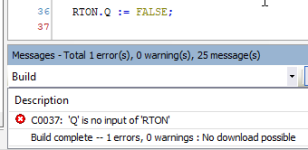AustralIan
Member
Yes. In the latest version at least, you cannot write to outputs from outside the Function BlockThanks!
So is there any difference between an argument in the VAR_INPUT block and an argument in the VAR_OUPUT block?
They also appear on the right hand side of the function block for the graphical languages.
In ST, your call must use the '=>' operator to assign the outputs to variables, so:
instance_name(in:= myin, out => myout);
Working the other side i.e. ET, just four statements, plus one for TT. Untested.
(* rtovar(IN:=RTOin, PT:=RTOpt, RST:= RTOrst // Inputs *)
(* , Q=>RTOq, TT=>RTOtt); // Outputs *)
(****************************************************************)

Last edited:




